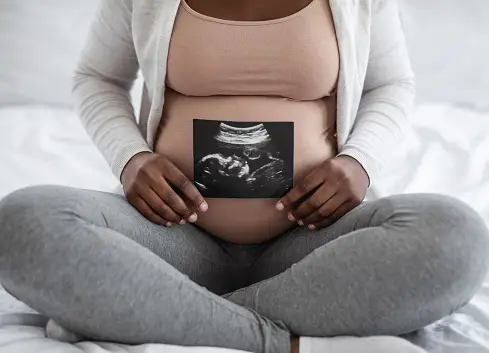A miscarriage is the unexpected ending of a pregnancy in the first 20 to 23 weeks of pregnancy. The main signs of a miscarriage are usually vaginal bleeding followed by painful abdominal cramping.
Why is a miscarriage common in early pregnancy?
A miscarriage is not an uncommon situation which happens in pregnancies, although it can be deleterious. Miscarriages are much more common than most people think and realise.
Miscarriages are common in early pregnancy because the babies do not develop properly. Most times, it's a function of the presence of abnormal chromosomes. These abnormalities in the chromosomes can end up in molar pregnancies, intrauterine fetal demise and anembryonic pregnancy.
These situations stated above result in either the embryo forming but not developing as intended or a foetus not developing at all, especially if both sets of chromosomes are abnormal. When your body notices that the foetus is damaged or has abnormal chromosomes, it may reject it and end the pregnancy.
Risk factors during early pregnancy
There are certain risk factors which may predispose one to miscarriage in early pregnancy. These risk factors include:
- Weight: Being obese or underweight increases the risk of miscarriage during pregnancy. Calculating your body mass index can tell if you're obese or underweight.
- Smoking, drinking alcohol and illicit drug use: Smoking and drinking alcohol predisposes one who is in a stage of early pregnancy to miscarriage. People who are smokers are at a higher risk of miscarriage than non-smokers. High use of caffeine and illicit drug use also raises the risk.
- Age: The risk of miscarriage increases as age increases from the age of 35. At age 35, one has a 20% chance of miscarriage. At age 45, the risk increases by about 15 to 20%.
- Long-term conditions: Ongoing health conditions can predispose one to a miscarriage. Someone who has diabetes or hypertension is at a higher risk of miscarriage than one who is free from these long-term chronic conditions.
- A previous miscarriage: If you have had a previous miscarriage, you are more predisposed by about 25% to have another miscarriage.
5 ways to prevent a miscarriage in early pregnancy
You cannot prevent a miscarriage. However, there are things you can do to reduce the risk that comes with early pregnancy, leading to a miscarriage.
Here are 5 ways to prevent a miscarriage in early pregnancy:
- Eat a balanced diet: Eating a nutrient-dense and balanced diet before and during pregnancy is vital to lowering the risk of miscarriages. Nutrition is not directly related to miscarriages, but balanced nutrition is vital for a healthy pregnancy.
- Maintaining a healthy weight: Being obese or underweight is a risk factor for miscarriage. Exercising and ensuring you gain or lose the weight needed would help you and your pregnancy and decrease your risk of complications all around.
- Take prenatal vitamins: Before conception and during pregnancy, ensure to take certain vitamins, which include folic acid and certain other vitamins, which would help reduce the risk of congenital disabilities that can lead to a miscarriage.
- Practice a healthy lifestyle: Stay away from alcohol, caffeine, cigarettes and any other illicit drugs which may pose a risk to you and your baby. Get enough sleep, eat well and limit your caffeine intake.
- Engage in prenatal visits: Ensure you visit your doctor daily for prenatal checkups and visits, as this would help diagnose any situation beforehand.
So many myths surround the issue of a miscarriage. Relax and know that you have done all you can for the good of you and your baby. Eat healthy and live a safe lifestyle.
Frequently Asked Questions (FAQs)
- How do I know I'm having a miscarriage?
You may notice bleeding that progressed from light bleeding to heavy bleeding accompanied by abdominal cramps and low back aches.
- What is a silent miscarriage?
A silent miscarriage or a missed miscarriage is one in which the foetus has stopped developing or died, but there are no signs such as abdominal cramping, bleeding or loss of fetal tissue.
- Can pawpaw cause a miscarriage?
Pawpaw is a controversial fruit in pregnancy. A lot of women reported experiencing cramps and contractions. Avoid pawpaw during your first trimester.
Why journey alone in your pregnancy? Join over 300,000 moms in PreggClass. For medically verified information, 24/7 check-up, live classes, practical sessions, and more! PreggClass goes for N10,000 per slot! Want to know more about PreggClass? Let's chat!










Comments